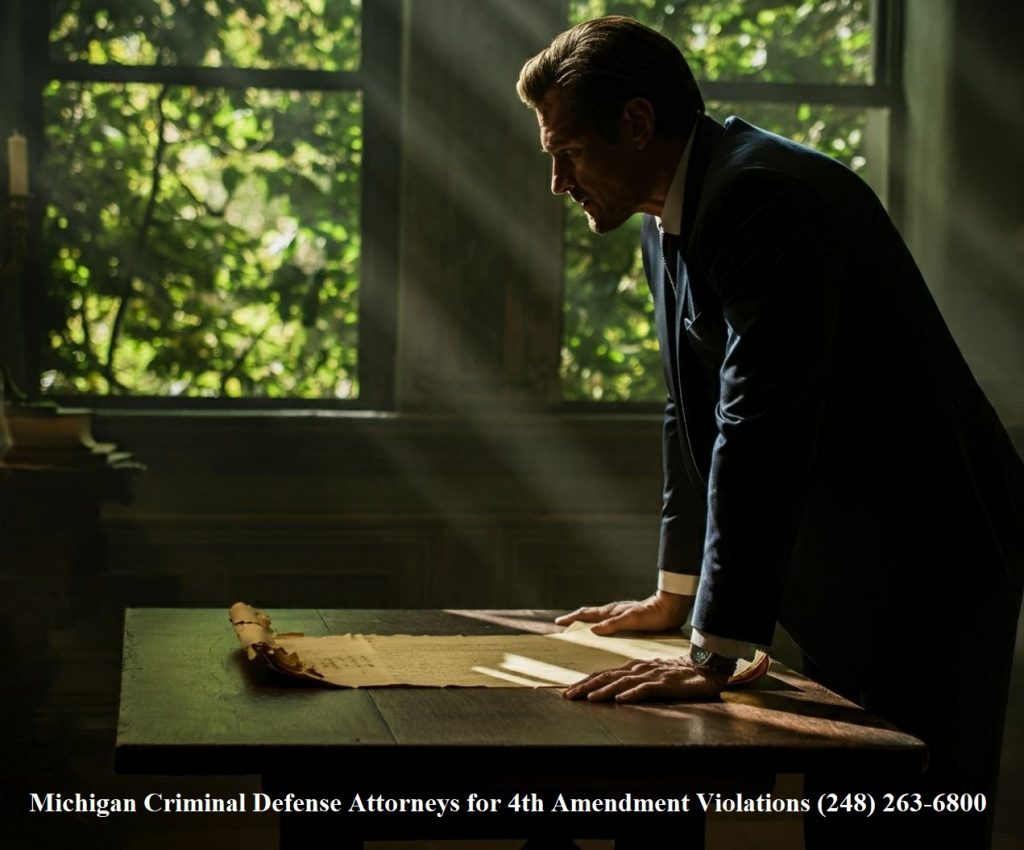Evidence Seized in Violation of the Fourth Amendment Must Be Suppressed.
Power corrupts, and absolute power corrupts absolutely. Police play fast and loose with constitutional rights because they so frequently get away with taking shortcuts.

Suppressing Evidence Seized in Violation of the Fourth Amendment
The FOURTH AMENDMENT to the United States Constitution protects the right of the people to be secure in their persons, houses, papers, and effects against unreasonable searches and seizures. It also provides that no warrants shall issue, but upon probable cause, supported by oath or affirmation, and particularly describing the place to be searched and the persons or things to be seized. Evidence seized in violation of the Fourth Amendment is subject to suppression and exclusion from evidence.
Here’s the exact text of the amendment:
“The right of the people to be secure in their persons, houses, papers, and effects, against unreasonable searches and seizures, shall not be violated, and no Warrants shall issue, but upon probable cause, supported by Oath or affirmation, and particularly describing the place to be searched and the persons or things to be seized.”
New Constitutional Case Law – Evidence Seized in Violation of the Fourth Amendment
In a recent case heard before the U.S. Court of Appeals for the Sixth Circuit, the court affirmed the district court’s order granting the defendant’s motion to suppress evidence seized in violation of the Fourth Amendment. Police officers observed a vehicle not dimming its high beams as it passed other vehicles. The officer observed the car’s occupants “lean over toward the floor of the car.” Upon stopping the vehicle, the officer discovered that the driver did not have a valid license and that the passenger, who was the owner of the car, had an expired license. After ordering the men out of the car, officers searched the vehicle and found a firearm.
The government tried to justify their warrantless search by stating that the search was incident to a lawful arrest and reasonable independent suspicion. The court found the first argument invalid under Arizona v. Gant, 556 U.S. 332, 343, 351 (2009). Arizona v. Grant states that police are authorized to search a vehicle for contraband only when they have reasonable suspicion that it contains evidence of the “offense of arrest” and when “the arrestee is unsecured and within reaching distance of the passenger compartment at the time of the search.” The police had the defendant standing at the rear of the vehicle, surrounded by other officers at the time of the search. As for the second justification, the court rejected that as well. It found the officer’s claim of reasonable suspicion not credible because the officer had testified at the suppression hearing that if the defendant had a valid license, he would have let him drive the vehicle away.
Exceptions to the Warrant Requirement – Seizing Evidence Without a Warrant
Sometimes, law enforcement officers can conduct a search or seize property without getting a warrant from a judge. These exceptions exist because certain situations require immediate action or are seen as not violating someone’s privacy rights. When an exception applies, the search or seizure is considered “reasonable” and complies with the Fourth Amendment, even without a warrant. These exceptions balance the need for effective law enforcement and public safety with individuals’ constitutional rights to privacy.
- Consent: If a person voluntarily consents to a search, no warrant is required.
- Plain View Doctrine: If law enforcement officials are lawfully in a position to see evidence of a crime in plain view, they can seize it without a warrant.
- Search Incident to Arrest: Upon lawfully arresting a suspect, police can search the suspect and the immediate surroundings for weapons or evidence that might be destroyed.
- Exigent Circumstances: In emergencies where getting a warrant would compromise public safety or lead to the loss of evidence, a warrantless search may be permissible.
- Automobile Exception: Due to the mobile nature of vehicles, if an officer has probable cause to believe there is evidence of a crime in a vehicle, they can search it without a warrant.

4th Amendment – Frequently Asked Questions (FAQs)
What does the Fourth Amendment protect?
The Fourth Amendment to the United States Constitution protects citizens from unreasonable searches and seizures by the government. This protection means that for a law enforcement officer to legally search a person or their property or seize their belongings, they typically need a warrant issued by a judge. This warrant must be based on probable cause (a reasonable belief that a crime has been committed) and specifically describe where the officer will search and what they are looking for. Evidence seized in violation of the Fourth Amendment is subject to suppression.
However, the courts have identified several exceptions to these requirements over time, such as consent to search, the plain view doctrine, searches incident to a lawful arrest, the automobile exception, exigent circumstances, and others.
Additionally, courts have interpreted the Fourth Amendment to apply to government intrusion into individuals’ privacy, a principle that has been adapted to new technologies and societal norms in a number of court cases.
How does the Fourth Amendment apply to search and seizure? When is evidence seized in violation of the Fourth Amendment subject to suppression?
The Fourth Amendment to the U.S. Constitution protects individuals from unreasonable searches and seizures by government entities. Typically, law enforcement must obtain a warrant, which requires “probable cause” and specifics about where and what to search. However, exceptions exist, including consented searches, items in plain view, searches incident to lawful arrest, exigent circumstances, and the automobile exception. This amendment balances the individual’s right to privacy with the state’s need to investigate and prevent crime.
What constitutes “reasonable” search and seizure under the Fourth Amendment?
According to the Fourth Amendment, when law enforcement conducts a search and seizure, it must be considered “reasonable.” Reasonable means they must have a valid warrant issued by a judge based on “probable cause” that a crime has been committed. “Probable cause” means a reasonable belief that a crime has occurred and that the search or seizure will provide evidence of that crime. However, some exceptions allow for warrantless searches, such as situations where consent has been given, the evidence is in plain view, the search is related to a lawful arrest, there are emergent circumstances, or when searching vehicles due to their mobile nature. Deciding what is “reasonable” often involves balancing an individual’s expectation of privacy and the government’s interest in preventing crime and ensuring public safety.
How does the Fourth Amendment apply to digital privacy and surveillance?
The Fourth Amendment offers protection against unreasonable searches and seizures, including digital privacy and surveillance. However, the details can be complex and constantly changing. The courts have ruled that people have a right to privacy regarding their digital information, like emails or location data, from their cell phones. Protection of the right to privacy means that law enforcement usually needs a warrant to access this data. However, the third-party doctrine complicates things. It states that the Fourth Amendment does not protect information given to a third party. Protection of 4th Amendment rights becomes tricky in an age where people store a lot of personal data with third-party providers like internet providers or cloud storage services. The laws in this area constantly evolve along with technology and societal norms.
What is the exclusionary rule in the context of the Fourth Amendment?
The exclusionary rule is a legal principle in the context of the Fourth Amendment. It prevents evidence obtained in violation of a person’s constitutional rights from being used in court. If law enforcement conducts an unreasonable search or seizure, which infringes on a person’s Fourth Amendment rights, any evidence obtained from that search cannot be used to convict the person in a criminal trial. This rule helps deter law enforcement from violating citizens’ rights and upholds the judicial system’s integrity.

Fearless Michigan Criminal Defense Attorneys
The court found that the district court did not err in concluding that reasonable suspicion to support the search did not exist. Therefore, if law enforcement officers violate the defendant’s Fourth Amendment rights, the judge must suppress any evidence seized from their vehicle. If you feel that your rights have been violated, it may be in your best interest to contact the Michigan criminal defense attorneys with LEWIS & DICKSTEIN, P.L.L.C. The best chance of winning in court and getting illegally seized evidence suppressed is with fearless, highly experienced criminal defense attorneys with a track record of winning.
Call us today at (248) 263-6800 for a free consultation or complete an online Request for Assistance Form. We will contact you promptly and find a way to help you.















